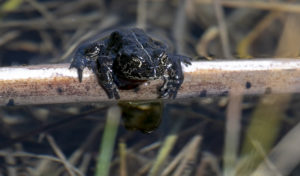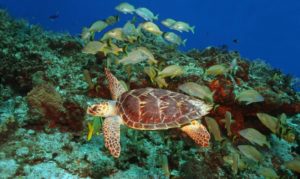
New rule would require shrimping boats to adopt measures that may reduce their impact on turtle populations.
Bubba, of Forrest Gump fame, captured the culinary love that Americans have for shrimp. They order it barbequed, boiled, deep fried, and a number of other ways as well. But the level of fishing required to satisfy domestic demand comes at a steep price: endangered sea turtles living along the coast of the United States have become inadvertent casualties of Americans’ voracious appetite for shrimp, often getting trapped and killed in the fishing nets used by America’s shrimp fleets.
However, the National Oceanic and Atmospheric Administration (NOAA), a scientific agency within the U.S. Department of Commerce, recently issued a proposed rule that represents “the next step in a long-term strategy for sea turtle conservation.” The proposed rule would require all shrimp boats from Texas to North Carolina to install “Turtle Excluder Devices” (TEDs) into their nets. These TEDs, which NOAA expects will cost between $325 and $550 per net, are metal grates that create an opening in the net that allows sea turtles to escape while still allowing fishing boats to retain their shrimp catches.
The Agency intends the TED requirements to further reduce the instances of “incidental bycatch,” the unintentional capture of marine creatures by commercial fishing vessels. By reducing incidental bycatch, this rule would subsequently lower the mortality rate for sea turtles, particularly for smaller sea turtles living in the coastal waters of the southeastern United States.
NOAA released the proposed rule as a direct response to a lawsuit filed by Oceana, a marine conservation and advocacy group. Oceana alleged in its lawsuit that “by not adequately monitoring or analyzing human impacts such as deaths inflicted by shrimp fishing” and by “failing to carry out reasonable measures to reduce impacts on sea turtle populations” in the southeast Atlantic, the federal government violated the Endangered Species Act, which lists all sea turtles living within U.S. waters as protected. Specifically, the Endangered Species Act protects five species of sea turtles in the Atlantic and Gulf of Mexico; three species are listed as endangered, and the other two are listed as threatened.
Current regulations for shrimp fisheries in the United States allow shrimp boats to forgo the use of TEDs by limiting the amount of time that fishermen can pull the net underwater. The Agency originally instituted the limitation on tow times to address incidental sea turtle deaths caused by drowning, as the nets prevent turtles from coming up to the surface to breathe. However, the Agency now seeks to withdraw the alternative tow time restriction and require all boats to use TEDs because new analysis indicates that limited tow times are not as effective as originally thought. The tow time restriction is difficult to observe and enforce, and anecdotal evidence and police data suggest that shrimp boats frequently exceed the restriction, although it is unclear to what extent.
Furthermore, Oceana estimates that over 50,000 sea turtles currently die every year due to the incidental bycatch of shrimp fisheries. Currently, the government requires less than half of the U.S. shrimp fleet to use TEDs. By introducing the proposed rule, which would extend the TED requirement to an additional 5,800 boats, NOAA asserts that it can potentially save up to 2,500 additional turtles in the Atlantic and Gulf of Mexico per year.
Lora Snyder, Oceana’s campaign director, applauded the Agency’s efforts. “With the simple solution of requiring shrimp boats in the Southeast to use TEDs,” she reportedly stated, “we would dramatically improve the survival and recovery prospects of sea turtle populations.” Moreover, she praised the proposed rule as a victory for the American shrimp industry because it reinforces the reputation of domestic-caught shrimp as “a safe, legal, and sustainable product.”
Nevertheless, industry groups have stated several concerns about the proposed TED requirements. David Veal, executive director of the American Shrimp Processors Association, voiced his sympathy for the sea turtles’ plight, reportedly saying, “We’ll do what we have to do to minimize the impact on the turtle population.” But he remained skeptical about the proposed rule’s potential economic effects. He reportedly cautioned that, “if turtles can get out of the nets, so can shrimp.”
Similarly, Acy Cooper, president of the Louisiana Shrimp Association, expressed his organization’s reluctance to take a position on the Agency’s proposal due to the difficulty that smaller boats could have with operating TEDs safely. “We know it’s coming, it’s just a matter of time,” Cooper reportedly said. “We want to make sure it doesn’t affect the guys, and we also want to make sure of the safety aspect of it.”
The Agency’s proposed rule was open to the public for comment until February 2017.



